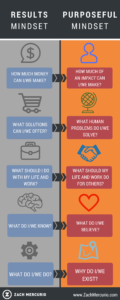“When you live by results, you die by results,” a good friend once told me in graduate school. And in my work with people and organizations, I’ve seen it time and time again.
- The university student who rests their own self-worth and “success” on achieving a grade, getting into a prestigious graduate school, or landing that high-paying entry level job.
- The sales team who puts in overtime to the point of burnout and relentlessly works solely to “have the best quarter ever.”
- The Fortune 500 company who invests millions in new, unnecessary product development just to keep up with a competitor.
The problem with results is precisely the fact that you can achieve them.
The college student gets into that graduate school, then what? The sales team has the best financial quarter, then what? That company successfully closes the gap with its competitor, then what?
Or the opposite happens, you never achieve your desired results and you or your team is crushed.
When we live for results alone, we’ll always need more goals, more work, and more products to keep us and our people motivated.
Results push us for the short term, but when we finally get to eat the carrot we’ll have to replace it with a new one.
That’s expensive pushing.
But there is an alternative to the never-ending cycle of results-thinking, a force that doesn’t “push” but rather endlessly “pulls” us forward; a force that doesn’t drive us, but inspires us to strive.
That pulling force is purpose, and research shows it may be the primary motivational force of humans.
 Results Don’t Inspire People, Purpose Does
Results Don’t Inspire People, Purpose Does
For example, research since the 1950s has demonstrated that people’s desire to work, study, or better themselves rests on motivations much deeper than financial security. In one landmark study from that decade, sociologists Nancy Morse and Robert Weiss looked for insight into why people work.
They pioneered the “lottery question,” which you’ve probably heard of, since it’s still frequently asked today: “If you won the lottery, would you continue to work?” The answer, overwhelmingly, was yes. Morse and Weiss’s results showed a critical error in the dominant thinking about work, one still made three-quarters of a century later: that people work primarily for money.
Morse and Weiss’s interviews with a random sample of more than four hundred employees revealed that work provided much more than just pay. “In fact, even if they had enough money to support themselves, they would still want to work,” the sociologists wrote, ‘working gives them a feeling of being tied into the larger society, of having something to do, of having a purpose in life.”
Their results have been replicated many times. In Man’s Search for Meaning,Victor Frankl referenced a Johns Hopkins University study in which 7,948 students at forty-eight colleges were asked what they considered important. Only 16 percent of respondents said that making a lot of money was important, while 78 percent said that finding purpose and meaning was important.
More recently, author and sociologist Reginald Bibby surveyed more than ten thousand new workers in various industries about what they thought critical in a good job. Most rated interesting work, a sense of accomplishment, and adding to people’s lives or to some larger purpose as far more important than pay or job security.
In my own research, I reviewed many of the major studies done in the last seventy-five years on why people commit to an organization or movement. I discovered that the weakest form of commitment was transactional (benefits and pay), and the strongest was emotional (connection to an organization, leader, or life direction).
One of the key ways to generate emotional commitment, my research also showed, is by cultivating meaning and purpose.
So why do our organizations and educational systems still focus so heavily on results — benefits, paychecks, bonuses, titles, suits — as the chief motivators?
It’s time that we listen not just to the research but to our workers and ourselves.
We are all wired for purpose, and we yearn to be compelled — not just driven.
And as Carol Dweck’s research on mindset implores, we can learn a new mindset.
But first, we have to learn to recognize the mindset we’re currently operating from.
A Results Mindset vs. A Purposeful Mindset
The infographic at the top of this article shows the key ways a Purposeful Mindset differs from a Results Mindset in the form of questions.
Research finds when we operate from a purposeful mindset we and our organizations are happier, healthier, and perform better.
Why? Because when we seek to serve others, our job is never finished.
The purpose always pulls us.
Where do you see yourself or your organization?
 Results Don’t Inspire People, Purpose Does
Results Don’t Inspire People, Purpose Does